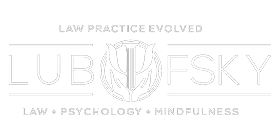At the core, most legal issues involve: (1) a specific behavior or series of behaviors; (2) pre-existing expectations held by people adversely impacted by the specific behavior(s); and (3) conditioned responses of those adversely impacted to the specific behavior(s) in question. Stress typically results from these situations insofar as feelings of safety and predictability are commonly threatened. When under stress, individuals typically revert to familiar ways of coping and assume a restrictive view both of what has happened, and the range of possibilities that may exist in potentially moving forward.
Traditional legal training is almost exclusively focused on the identification of facts (behaviors) and the application of normative judgments (laws) to these facts. The bypassing of individual and interpersonal dynamics inherent in most legal training usually leads to less-than-optimal solutions in which one side “wins” and the other side “loses.” Thus, the major reason that typical attorneys bypass individual and interpersonal dynamics of their clients is simply because they lack the professional training to do so.
While attorneys and psychotherapists are both ethically bound to maintain the confidentiality of their clients, traditional attorneys are not specifically trained to create an empathic environment in which clients feel safe to explore more deeply-rooted fears and insecurities commonly triggered by conflict and legal disputes. Legal clients are rarely encouraged to explore beliefs residing below immediate consciousness – beliefs that may actually be driving their reactions to the specific behaviors that have occurred. As a result, decisions of clients that ultimately dictate legal strategy often emanate from a narrow, fear-based point that ignores consideration of what is most true and meaningful to the client.
On the other hand, while psychotherapists are trained to create a safe, empathic space in which clients can explore and gain clarity on what is truly important to them, this is done exclusive of knowledge of the legal framework that the client must navigate to successfully address his or her situation on a practical level.
In combining practice law practice experience with training in psychotherapy, a holistic lawyer can create a unique forum in which clients can successfully address their practical concerns in optimal ways consistent with their authentic selves, and the needs of others impacted by the ways in which the situation is potentially resolved. This level of authenticity often lies beneath the habitual reactions commonly triggered in conflict-laden situations that can usually be explored only in a specifically tailored environment conducive to such inquiry.
For more information on holistic law practice combining law and psychology, visit http://www.Holistic-Lawyer.com, or call (415) 508-6263.
About the Author
Michael Lubofsky is an attorney admitted to practice law in California and Connecticut. He is a graduate of the Boston University School of Law, and the University of Massachusetts at Amherst with a B.A., cum laude in Psychology. Mike is currently completing his first year in a master’s program in Counseling Psychology at the Wright Institute in Berkeley, California.
